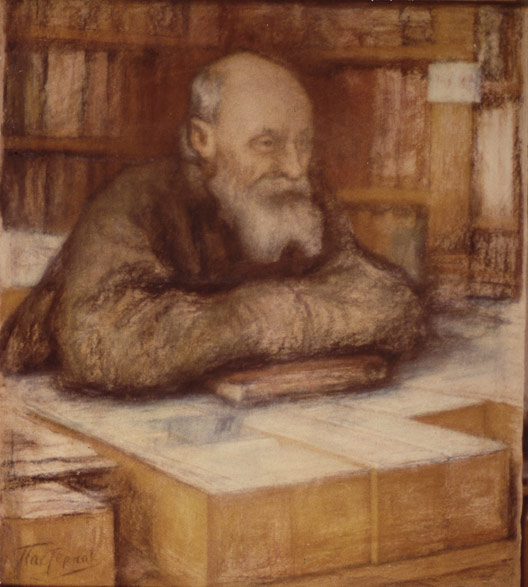Proposal for a Museum: Nikolai Fedorov, Philosophy of the Common Goal (19th cen.)
Today: Russian cosmist philosopher Nikolai Fedorov.
Via Boris Groys, “The Artist as Curator of Bad Art,” in Exposition Imaginaire: The Art of Exhibiting in the Eighties, Rijksdienst Beeldende Kunst, ‘s-Gravenhage, 1989:
Russian philosopher of the late 19th century Nikolai Fedorov created a so-called “philosophy of the common goal,” which was to organize the entire technical potential of humanity in order to realize, on a scientific basis, the artificial resurrection of every person that ever lived on earth. The first stage on the road to realizing this “common goal” — its grandiose prospects influenced many leading Russian scientists, poets, artists, et cetera — was to be the establishment of a single museum, where everything that testified to the life of everyone who ever lived would be exhibited and in the future could be used for his resurrection. In some sense [Ilya] Kabakov’s installations can be seen as a simulacrum of such a museum. But, in the reality of irreversible history, this museum still awaits its curator.

Leonid Pasternak, Nikolai Fedorovitch Fedorov, pastel, late 19th c.— drawn surreptitiously while the philosopher was at work at his day job as museum librarian at the Rumiantsev Museum.
Via Nikolai Berdyaev, “The Religion of Common Resurrection: The Philosophy of the Common Task by N. F. Federov,” an unpublished manuscript from 1915, as translated in 2002 by Fr. S. Janos:
In burial there is already the principle of resuscitation. Man is a being, which buries — here is an essential definition of man. With this is connected Fedorov’s love for museums, as seeds of resuscitation, and his dislike for exhibitions, as a betrayal of the fathers and self-exalting. Just as with the church-temples, museums ought to be cemetery-like. “Only a cemetery can be transformed into a complete museum, rather than museum cabinets of only the rare, such as with present-day museums. Only the cemetery-like museums are memorials for all the people without exception, rather than of merely some of the great; only cemetery-like museums make all an object of knowledge and for all to be known, if they be not separated from the schools.”
For more information see:
The Russian Cosmists: The Esoteric Futurism of Nikolai Federov and His Followers
Comments (5)
Awesome! Fedorov is the original life extensionist! He was definitely ahead of his time in plotting a way out of our finite, aging bodies!
Thanks Brent, what a great story—similar in some ways to Pasternak’s tale of making his portrait, also from the Cosmists book:
“Pasternak tells us that once while working in the Rumiantsev Museum, he became intrigued by the appearance and manner of the old man who served in the reading room. He began to make a sketch, but noticed that the old man suspected what Pasternak was doing and obviously did not like the idea of being drawn. So for several days in a row, Pasternak sat behind a mountainous stack of books and tried to appear to be busy reading them. He would look up only infrequently, so as not to arouse the old man’s suspicion. He kept his sketches, and only later learned that the old man was the philosopher Fedorov.”
We dunno, we’re glad to have to portrait, but we’re totally sympathetic to the old man’s grumpy discomfort.
Also, it’s fascinating to see the “love for museums” alongside the “dislike of exhibitions”—it brings back to memory an era when the two were rather distinct forms of aggregation and presentation. Fedorov would have recoiled from the modern idea that exhibitions are the primary thing that museums are meant to do. (For him their task is to create an archive, not for the present, but for the future.)
That Russian Cosmists book is terrific. Leo Tolstoy is quoted in it saying the following of Federov: “Once I happened to catch sight of a little book in the Rumiantsev Museum—a list of colonels for some certain number of years—and I smiled. Did [Federov] scold me! ‘All this is needed—all these are reminiscences of our ancestors.’ Now he can’t abide me: in the first place because I don’t share his theory; in the second place, because I love death.” Federov’s life and thought are amazing, tho i suppose this anecdote shows he would have made a pretty bad museum docent.
very good
sfaflsdafsafa